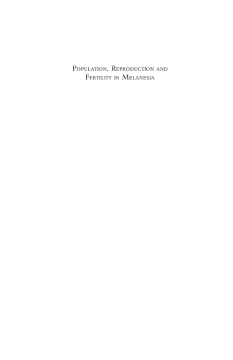
Additional Information
Book Details
Abstract
Human biological fertility was considered a important issue to anthropologists and colonial administrators in the first part of the 20th century, as a dramatic decline in population was observed in many regions. However, the total demise of Melanesian populations predicted by some never happened; on the contrary, a rapid population increase took place for the second part of the 20th century. This volume explores relationships between human fertility and reproduction, subsistence systems, the symbolic use of ideas of fertility and reproduction in linking landscape to individuals and populations, in Melanesian societies, past and present. It thus offers an important contribution to our understanding of the implications of social and economic change for reproduction and fertility in the broadest sense.
Stanley Ulijaszek is a Professor of Human Ecology at the Institute of Social and Cultural Anthropology, University of Oxford. He co-authored Nutritional Anthropology (1993) and wrote Human Energetics in Biological Anthropology (1995), and is editor of the Cambridge Encyclopedia of Human Growth and Development (1998). He is co-editor of Homo. Journal of Human Comparative Biology and book review editor of the Journal of Biosocial Science.
NOMINATED FOR THE 2007 BOOK PRIZE BY THE COUNCIL ON ANTHROPOLOGY AND REPRODUCTION (AAA)
“…provides a significant contribution to our knowledge of changes in fertility through its well-described historical and demographic sections, which in anthropological studies of reproduction are usually missing or lacking in depth… [The volume] successfully display[s] the richness of fertility concepts, practices and solutions in the Melanesian area and their relevance for unmasking some of the historical and contemporary myths on kinship demographic changes.” • Bijdragen. Journal of the Humanities and Social Sciences of Southeast Asia and Oceania
